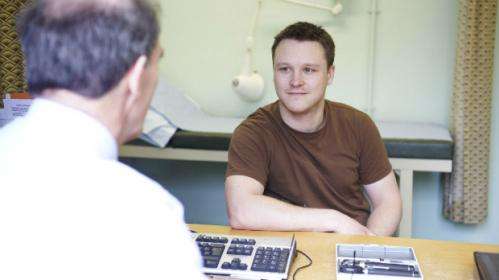The challenges of diagnosing cancers earlier: a GP's perspective

As GPs, we know that too many of our patients worry about wasting our time – a point underlined by a recent Cancer Research UK-funded study.
We also know that patients in this country are more likely to worry about seeing us when they have symptoms, and perhaps put off seeing us for longer, than elsewhere. And this is felt to be one of the many factors that contribute to the UK's relatively poor cancer outcomes, compared against similar health systems both in Europe and further afield.
Diagnosing patients earlier has a big impact on their outcomes. For example more than 9 out of ten patients (93 per cent) diagnosed with bowel cancer at the earliest stage survive for 5 years or more, compared with below one in ten (7 per cent) in the most advanced stage of the condition.
On top of this, for the four cancer types where we have data, the financial cost of treating at an early stage early is nearly two-and-a-half times lower of that of treatment at the later stages.
So, how can we – as a country – do better?
A helping hand?
The challenge facing both GPs, and our patients, is identifying when someone needs to seek advice regards their symptoms. GPs are seeing many patients that have concerns about their symptoms – particularly during the winter months – and yet there are still patients with potentially serious symptoms who we are not seeing.
We need to think of novel ways to address this. In the current era of easy access to all manner of information via the Internet, social media, surgery websites etc, there is plenty of opportunity to empower people to seek advice, and raise awareness of key cancer symptoms. And although we need to be mindful of widening the gap between rich and poor, the uptake of smartphones across social divides is encouraging.
And over the past four years, the Be Clear on Cancer campaigns have tried to address the issue with both targeted campaigns – such as the "Blood in Pee" and the current "Three weeks of heartburn" – and other more general campaigns. Results have been encouraging, notably for the "Three week cough" campaign.
As GPs we should be reinforcing appropriate consulting behaviour– for example, coming to see us when people notice something persistent or unusual, such as a cough that won't go away – and encouraging patients to take advantage of the other types of services available to them. Pharmacies, for example, are a largely untapped resource – while most surgeries offer telephone consultations with both GPs and practice nurses.
We also need to encourage our patients to seek advice about their symptoms if they're worried. This can be done by providing information in the practice leaflet, on the practice website and having information posters on the practice notice boards.
A caring profession
Underpinning all of this: GPs are a caring profession, albeit a time challenged one. But in the long run it will save everyone time if we are approachable and listen to our patients and their concerns.
I remember being taught at medical school that the patient has only wasted their GP's time if they feel they have wasted their own. As we clinicians reflect on our consulting skills and the performance of the NHS as a whole, we should be aware of the rather challenging statistic: half of all cancer patients are currently diagnosed at a late stage.
So one of the challenges for all of us is for the public to be both up-skilled in cancer awareness, and empowered to access the right person – be that a GP, a nurse, a pharmacist, or the expertise on offer at walk-in centres – at the right time.
GPs, like all in caring professions, want to make a difference to our patients and their families – and we are best able to do this if patients know that they can, and should, see us when they need us.


















